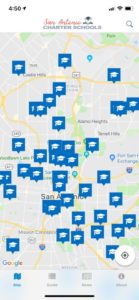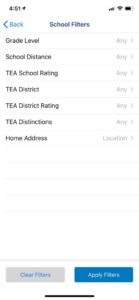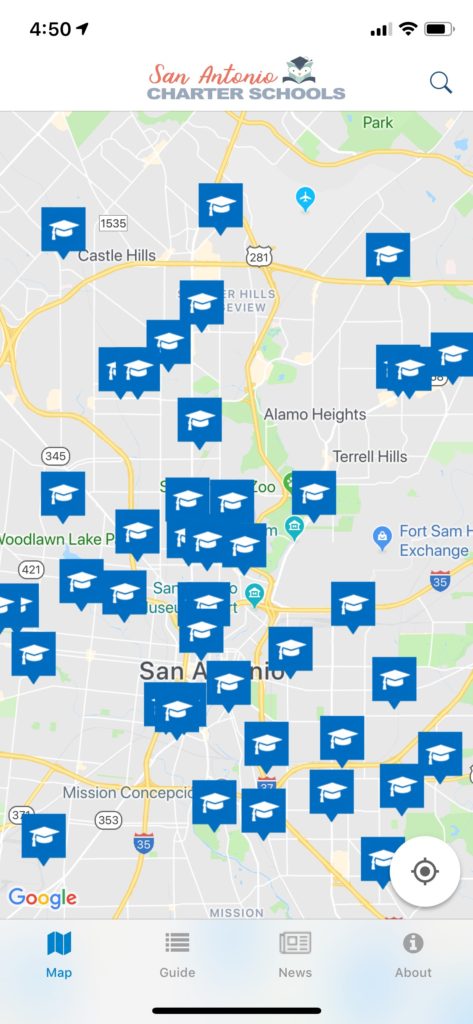Note from SA Charter Moms: We are proud to share guest posts from hallmonitor covering San Antonio’s public schools.

A couple of weeks ago, Inga Cotton, aka San Antonio Charter Moms, launched a new app. It’s a school choice tool, listing all of the open enrollment programs in San Antonio—charter and district options.
There’s a ton to say about this app. One could comment on female-led app development. Or the fact that it’s the first of its kind in San Antonio, which, until now has relied on the legwork of motivated parents to not just discover schools, but to figure out how they perform and what they offer.
I could talk about all of that, and it would be worth noting. However, what struck me the most about the rollout of the app was this: equity is in the details.
A lot of people have opinions about Cotton, the outspoken, hat-wearing charter school champion whose personal mission sprouted into a blog and blossomed into full blown advocacy.
With my own ears I’ve heard criticisms from people who don’t like the way she operates. I’ve also seen the more subtle ways she’s been sidelined by people who don’t like what she represents. Watching her over the past few years, I’ve seen her sort of tiptoe into life as a public figure while her Facebook group exploded, while foundation money poured into the city, while school districts and charter networks duked it out at the statehouse and elsewhere.
The roll out of the San Antonio Charter Moms app said a ton about who Cotton is and has become, and signaled her intent to stop tiptoeing and to start running.
The app is all. about. parent. choice. The search filters allow parents to set the priorities. Cotton has always been clear about what she’s about, and she’s a true believer. You don’t have to like charter schools or magnet programs or choices within districts. But you can’t accuse Cotton of operating in bad faith. Lately I’ve seen a LOT of bad faith arguments going around. People who aren’t being up front about their true concerns or intentions. Cotton is not one of them.
The app was developed as a personal project by Cotton and a volunteer, and will be licensed for free to her non-profit, San Antonio Charter Moms. However, because she’s clear on her mission, people shouldn’t say, “gotcha!” when they see the non-profit and the app praised, funded, or conversing with foundations who like what Cotton is doing.
Here’s something I once didn’t know about foundations like Gates, Walton, Brackenridge, and others: When they like what you are doing, those foundations find you, and figure out how to keep you doing what you’re doing. I’ve watched this play out over and over in a handful of organizations. While it’s convenient to think of all funders as these big, dark organizations that put puppets in place all over the country . . . that’s just not what I’ve seen. I’m not saying it doesn’t ever happen, but seeing a foundation name linked to something is not a good enough reason to write it off as a puppet org, the fingertip of dark money, or some other nefarious metaphor.

There’s nothing terribly spooky about the information in the app, mostly Texas Education Agency data. While there’s plenty not to like about how TEA ranks schools, and I agree that data doesn’t tell you the whole story, it does provide some outside measurement for how schools are doing meeting the most basic requirements.
I want to digress a bit about the whole standardized test thing, especially as it relates to ed reform. I’m not a fan of standardized tests, not for my kids, not for anyone. I hate how they have taken over our schools. I think the current tests we used are too amenable to middle class advantages. We need a better system.
That said, we absolutely must have objective measurements for student achievement.
We cannot go back to a system where the quality of education varies from state to state, district to district, school to school, classroom to classroom with no way prove it. We cannot allow the criteria to lean toward the subjective. Because history shows us that those with the power to evaluate are not always able to correctly assess students from culture other than their own. Think of it like the long jump vs. figure skating. Even if some kids have to jump from further back, at least their performance is measured by feet and inches. If we go to a panel of judges, we have to reckon with the history of docking points for income and skin color.
I’m all for figuring out how to help kids all jump from the same foul line. I’m all for reckoning with our history of biased judging. But there are more people succeeding at the former than the latter right now.
Back to apps and equity.
The app is on mobile (iPhone and Android), is being translated into Spanish, and you can sign up for push notifications for schools that interest you. Accessibility is everything in equity. Cotton’s own experience with her son, who is on the autism spectrum, convinced her that not every school will be able to serve every kid, regardless of what the Texas Constitution says they should do. It would be nice, but it’s not happening this year. However, she also saw how much of her educated, privileged capacity was spent finding that school. Had she been required to work 12 hour days, had she not spoken English, had she not had access to a home computer with reliable internet . . . the search would have been infinitely more difficult, if not impossible.
We tend to see “convenience” as a word for the wealthy. Like it’s something that rightfully carries a price tag. Like people with less resources should have to search longer, wait longer, travel further, follow up more frequently. This mindset is how the school choice movement got hijacked. How lottery systems grew overloaded with people with 100 good options, instead of those with one. Getting information into the hands of everyone, having that information meet them where they are, reminding them of application deadlines, lottery dates, and waitlist announcements—that’s big for equity.
I’ve downloaded the app. It’s easy to use, and sort of fun, in the way that all search tools are fun. But it also does something to level the playing field. Like Cotton, I’ve had the advantage of being vocationally tasked with learning about schools. It made my own school choice journey highly informed, as hers was. Apps like this take that knowledge and tools gleaned from years of full time digging, and make it available to anyone who wants it, and especially to those who need it.
Originally published as “On mobile apps and equity,” Hall Monitor, April 24, 2019
Read more:
- “[Hall Monitor] Three Teachers Who Made Me Say ‘Wow’ This Year,” San Antonio Charter Moms, April 13, 2019
- “[Hall Monitor] The McNeels Choose a School–Part Eight,” San Antonio Charter Moms, February 23, 2019
